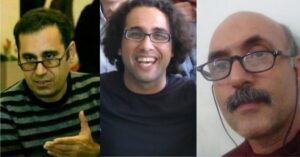The following is based on a communication written by the UN Special Rapporteur on Human Rights Defenders and other UN experts to the Government of Turkey on 19 July 2023. The communication remained confidential for 60 days before being made public, giving the Government time to reply. Regrettably, the Government did not reply within this time frame. If a reply is received it will be posted on the UN Special Procedures communications database.
This is a shorter version of the original communication.
BACKGROUND
Topics: the threats and alleged attack, possibly amounting to torture, of Aytekin Aktaş while he attempted to carry out his professional duties as a human rights lawyer assisting members of the “Life Watch” protests; the alleged repression of the “Life Watch” movement by the Gendarmerie which in some cases involves threats and physical violence.
Mr. Aytekin Aktaş is a human rights lawyer and human rights defender. He is a member of the organisation Progressive Lawyers Association (Çağdaş Hukukçular Derneği – ÇHD) as well as the group Lawyers for Justice (Adalet İçin Hukukçular). Since the earthquake on 6 February 2023 gravely affected Turkey, Mr. Aktaş has been offering his legal services on a voluntary basis to those impacted by the disaster.
The “Life Watch” movement started on 3 April 2023 in the Samandağ district of the Hatay province, in response to the hazardous practices adopted in the earthquake crisis management. The initiative seeks to draw attention to the health and environmental risks associated with this management, namely the lack of sufficient measures taken by public health policy to protect against these risks. The movement is made up of citizens living in the area who are earthquake survivors, and includes environmental human rights defenders, ecology activists, representatives of local civil society organizations, unions, professional bodies and political parties. Among their activities, they have campaigned to raise awareness on these concerns, issuing press statements in relation to the problematic management of the earthquake. They have also voiced their concerns publicly, holding conferences and peaceful protests.
Their demands include covering of the debris during transport to reduce the spread of substances such as silicas, heavy metal paint and asbestos; better measurement of air to identify the presence of these substances; and occupational health training for those engaged in piling the rubble. Protests held over several days during April 2023 by the “Life Watch” movement were met with violence by Gendarmerie.
ALLEGATIONS
Since the onset of the two earthquakes on 6 February 2023, many buildings in Turkey have collapsed and been damaged, particularly in those regions closest to the epicenter, such as the Hatay province. Practices of piling the debris and rubble of fallen buildings has become common in the State’s efforts for disaster relief. Some of this debris is being piled in populated residential areas and others on agricultural land.
On 7 February 2023, the President declared a state of emergency in the ten cities affected by the earthquake until 7 May 2023. These emergency legal powers entered into force on 8 February 2023.
The case of the “Life Watch” movement:
On 4 April 2023, a peaceful protest was held by the organization “Life Watch” in the Yeşilköy Neighborhood of Samandağ, a district in the region of Hatay in southern Turkey. This region has recently been severely impacted by the earthquake of 6 February 2023. As part of the protest, survivors of the earthquake assembled to publicly read a press statement. Reportedly, however, the Gendarmerie detained a participant involved in the protest at the scene.
On 17 April 2023, protestors belonging to the “Life Watch” movement assembled to read their press statement in front of the governor’s office in Hatay. Police again intervened to prevent the protests. Protestors and earthquake survivors have reportedly been threatened with violence by law enforcement officials.
In light of the police violence, and their freedom of opinion and expression having been curtailed, the “Life Watch” movement have changed the focus of their activities to instead conduct workshops to raise awareness amongst the earthquake survivors, as well as engaging in strategic litigation and environmental reporting.
The case of Aytekin Aktaş:
On 4 April 2023, the date of the peaceful protest held by the “Life Watch” movement in the Yeşilköy Neighborhood of Samandağ, in the Hatay district, human rights defender and lawyer Mr. Aytekin Aktaş visited the scene of the protests in question as part of his voluntary legal assistance in relation to the earthquake. Mr. Aktaş was informed that one of the protestors who had taken part in the demonstration was being detained by the Gendarmerie. On this basis, the human rights lawyer decided to go to the Samandağ vicinity.
Upon Mr. Aktaş’s arrival at the site of the protests, more specifically behind the Samandağ-Antakya Road in Yeşilköy, the human rights defender addressed the police authorities present and identified himself as a lawyer, asking to see his client, in reference to the individual who was being detained. At first, the Gendarmerie officer he spoke to informed Mr. Aktaş that his client was being detained inside a vehicle. However, when the human rights lawyer persisted in his questions and asked whether the Gendarmerie had a requisite detention order for the detainee in question, in accordance with the law, the Gendarmerie officers allegedly became hostile towards Mr. Aktaş. They verbally insulted him and intimidated him by roughing him up. They dismissed his inquiries about a detention order and declined to provide further information in this regard.
When Mr. Aktaş maintained that the detention without the requisite order from the prosecutor’s office was not legal, and that the police interference with Mr. Aktaş performance of his duties as a lawyer was in contravention of the law, the Gendarmerie officers would have reacted violently. The officers would have physically assaulted Mr. Aktaş and other protestors present at the scene and forcibly removed them from the vicinity of the vehicle where the protestor was being detained.
At this point, Mr. Aktaş used his phone to take a recording of the violence being perpetrated by the police. On seeing this, the officers reportedly removed the name tags they were wearing from their uniform, so as to conceal their identity, and confiscated Mr. Aktaş’s phone. Following this, at least 10 Gendarmerie officers attacked Mr. Aktaş and dragged him to a more discrete location between two vehicles. Once partially concealed by the cars, the officers proceeded to violently attack Mr. Aktaş. They subjected him to various forms of beatings, kicking him, punching him and striking him with batons. They reportedly stepped on his neck with their boots and dragged him on the ground. They twisted his arm around and subjected him to psychological abuse by making him believe that they would snap it, encouraging one another to “break his arm”. They also threatened to kill him, arguing that they were in a “state of emergency region” as justification for this threat, and saying “we will kill you here and no one can do anything about it”.
In addition to physically assaulting Mr. Aktaş on the ground, the assailants subsequently forced him inside one of the vehicles where they continued their violence which may amount to torture. The perpetrators forcefully held the human rights lawyer inside the vehicle and refused to release him, only eventually letting him go after 30 minutes.
Once released, Mr. Aktaş tried to document the information that would enable him to file a complaint about the attack, collecting details such as the names of the officers involved as well as the license plates of the vehicles. Allegedly, these observations provoked the officers to subject the human rights defender to another round of attacks. This assault only concluded when Mr. Aktaş managed to escape.
Furthermore, other protestors at the site who witnessed the attacks, possibly amounting to torture of Mr. Aktaş, were reportedly also violently detained.
ÇHD, the non-governmental organization to which Mr. Aktaş belongs, filed a criminal complaint with the Hatay Chief Public Prosecutor’s Office concerning this incident. At the time of this communication, we are unaware of any measures taken to investigate this incident.
CONCERNS
In the communication, we wish to express our serious concern at the physical assault of human rights lawyer and defender Mr. Aktaş, as well as the threats and intimidation to which he was subjected.
Should these allegations be confirmed, the facts alleged would contravene the United Nations Convention against Torture, ratified by Turkey on 2 August 1988. We underscore that the prohibition of any form of ill-treatment under international law is absolute and non-derogable.
We are particularly concerned at the information that describes that Mr. Aktas was beaten after identifying himself as a lawyer trying to fulfil his legal functions. The legal profession and its free exercise are an essential element of the rule of law, the protection of human rights and the functioning of an independent judicial system. The free exercise of the legal profession contributes to ensuring access to justice, oversight of state power, protection of due process and judicial guarantees. According to international standards, States must guarantee that those who practice law can do so free from intimidation, obstacles, harassment or interference.
We would additionally like to express our concern regarding the emergency legal powers introduced by President Erdoğan on 7 February 2023 in the ten cities affected by the earthquake, which came into force from 8 February 2023 to 7 May 2023, and which, we note, were enacted in addition to other disaster response legislation in Turkey such as Law no. 7269 on “Precautions to be Taken due to Disaster Affecting Public Life and Assistance to be Provided”. Given the reported information received, by Mr. Aktaş in particular, these measures appear to be co-opted as a threat by officials whereby members of the police allude to the state of emergency laws as allowing them to commit violations with impunity and free from redress. This would suggest that the emergency measures are in fact being weaponized against civil society and earthquake survivors who express criticism at the state’s disaster response, in violation of international law.
We would like to further express our concern regarding the targeting of peaceful protesters involved in the “Life Watch” movement. Such threats and detentions of peaceful protesters creates a chilling effect for protest movements in Turkey, and ultimately curtails the rights to freedom of peaceful assembly and freedom of expression.



